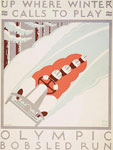Dempsey Fight Bell
Tukufu Zuberi speaks to Bert Sugar, author of over 80 books on boxing history, about boxer Jack Dempsey, his fame, and his 1919 fight for the heavyweight world championship.
Tukufu Zuberi speaks to Bert Sugar, author of over 80 books on boxing history, about boxer Jack Dempsey, his fame, and his 1919 fight for the heavyweight world championship.
A panel including sports columnists and announcers and the Boston Red Sox president discusses how perception and management of baseball has changed over time. The panel addresses contemporary material as well as historical.
Video and audio options are available.
ESPN newsanchor and author Jeremy Schaap discusses African-American track and field athlete Jesse Owens's win of four gold medals and setting of three world records at the 1936 Berlin Olympics. Schaap examines the events in the context of Hitler's Germany's racism.
Professor Gerald L. Early discusses cultural observations on Curt Flood, the first player in Major League Baseball to challenge the infamous "reserve clause" which opened the doors to free agency. Early focuses on the significance of sports as a public arena.
This Electronic Field Trip uses the history of early baseball as a window into American life in the 19th century. Watchers journey back in time to discover a young land as its enterprising soul comes of age in the villages and towns of 19th-century America and follow the exploration of a western frontier after an anguishing Civil War to see how natives and naturalized citizens forge a familiar pastime while learning each other's customs and cultures.
According to the Apple Learning Interchange site, "The National Baseball Hall of Fame and Museum and the National Park Service present a sobering visit to the Manzanar War Relocation Center. This National Historic Site provides a compelling classroom to relive the experience of Japanese Americans held captive during World War II, as well as the plight of countless nationalities who face discrimination and intolerance still today. This is a tale of the indomitable Issei and Nisei generations. Watchers can learn through the emotional memories of survivors, and the invincible cheers of detainees at baseball games that still echo across the desert valley.

The 2012 Summer Olympic Games begin on July 27 and continue through August 12. London hosts them this time, but in the past, the U.S. has hosted the Olympics eight times (four times in the summer and four in the winter), the most of any country! The U.S. also holds the greatest number of Olympic medals of any nation—more than 2,500.
What place have the Olympics had in U.S. history? The games can be many things: a focus for cultural exchange, a showcase for new technology and development, an economic boon (or bust), and a platform for international political tensions. Explore the history of the Olympics with these ideas:
Whether you use the Olympics to explore cultural and technological change, international politics, local history (if you're lucky enough to live in one of the U.S. cities that hosted the Olympics!), or any of the many other rich angles possible, take advantage of this opportunity! Though school may not be in session for you right now, investigating Olympics history can lead to primary sources and historical connections you can weave into your curriculum.
Teaching with sports history doesn't have to stop with the Olympics! Sports can help students connect to history and see how many different forces contribute to a person's life or a historical event. Browse our Website Reviews for sports-related primary sources, take a quiz on sports history, or watch historian Pellom McDaniels III connect athlete Jackie Robinson and Martin Luther King Jr. using primary sources.
The Oklahoma Historical Society, with its affiliate, the Jim Thorpe Foundation, preserves and displays the former home of the 1912 Olympian containing exhibited artifacts from Jim Thorpe and his family.
The home offers tours.
The National Soccer Hall of Fame and Museum presents the history of soccer within the United States, recognizes figures who have excelled at the sport or influenced its playing, and hopes to inspire continued interest in soccer. Museum collections include trophies, jerseys worn by stars such as Caligiuri, historical soccer gear, and Major League uniforms.
The site offers exhibits, summer soccer tournaments, halls of fame, a game zone, and research library access. Visitors are asked to call ahead in order to use the research library.
Professor Jules Tygiel reviews the life of Jackie Robinson and his relationship to and support of the Civil Rights Movement. Tygiel focuses not on Robinson's life as a baseball player, but on his wider cultural and social impact.